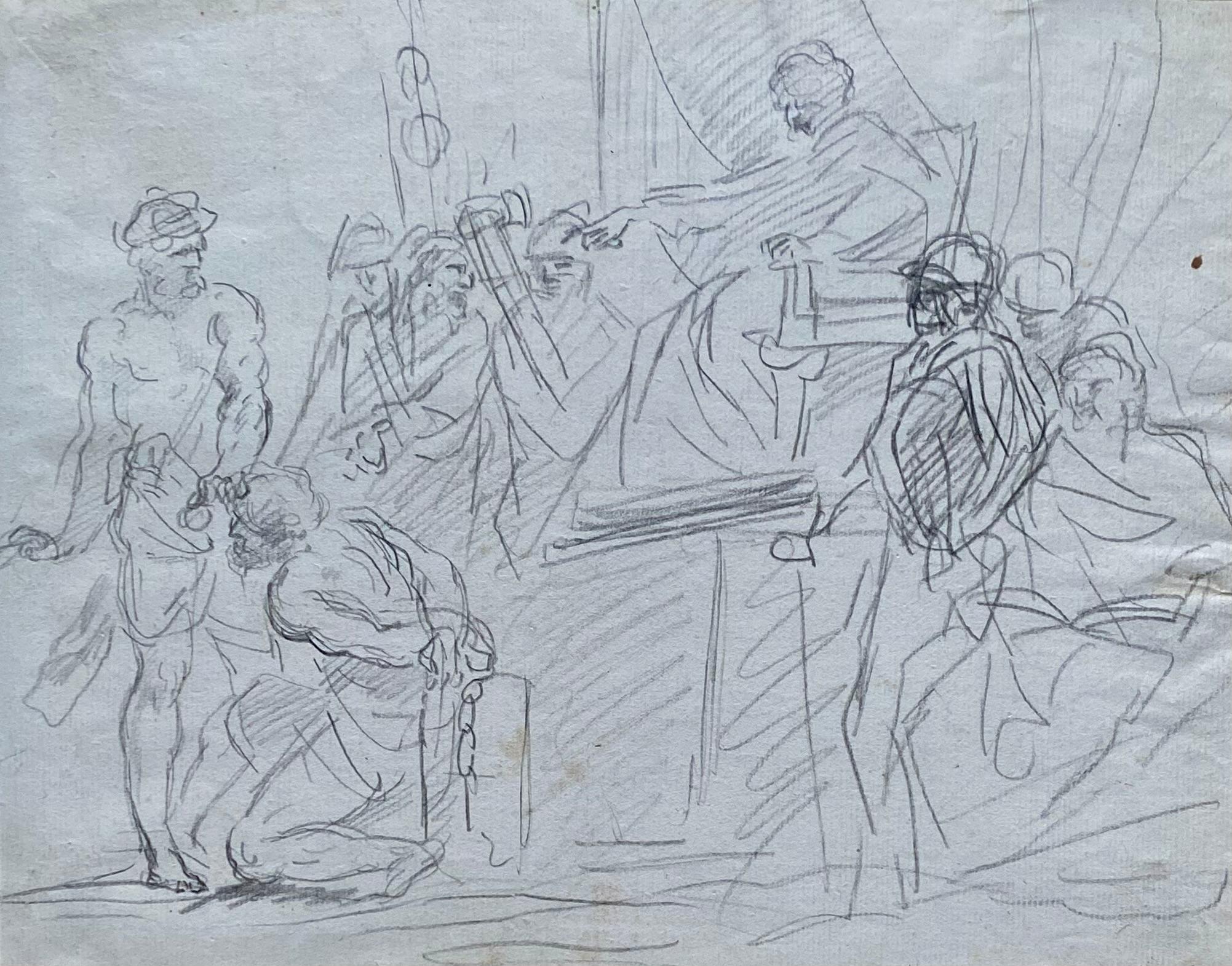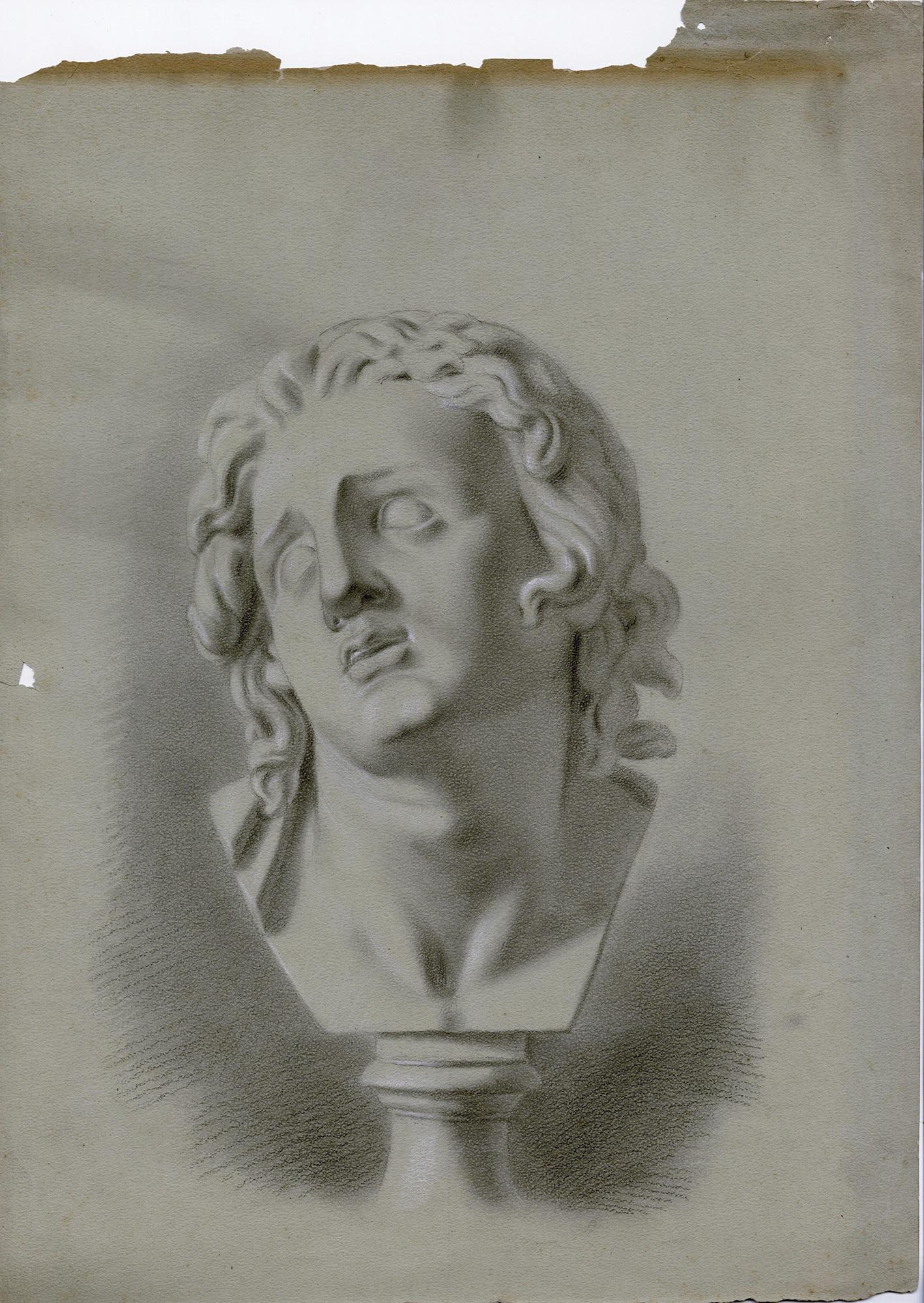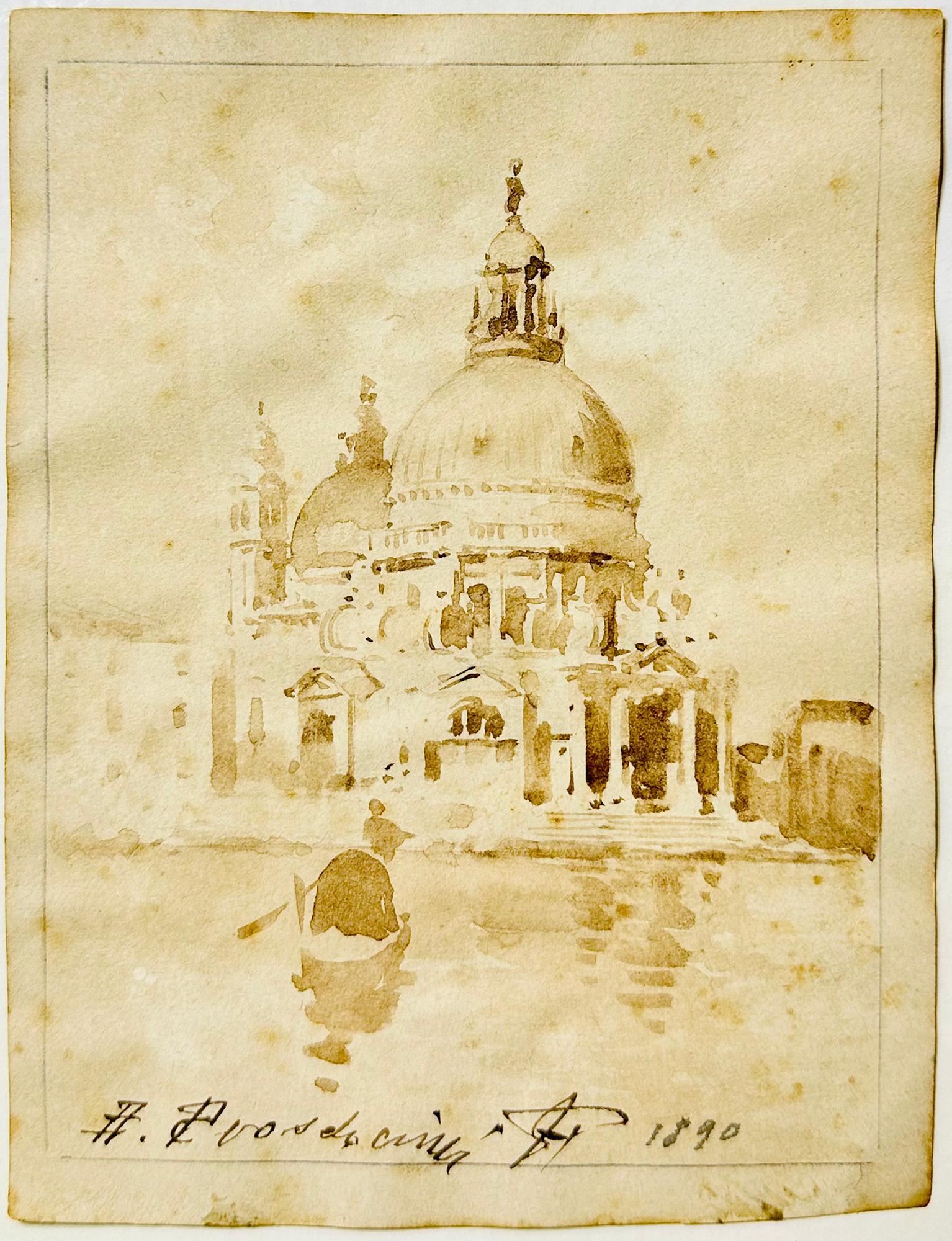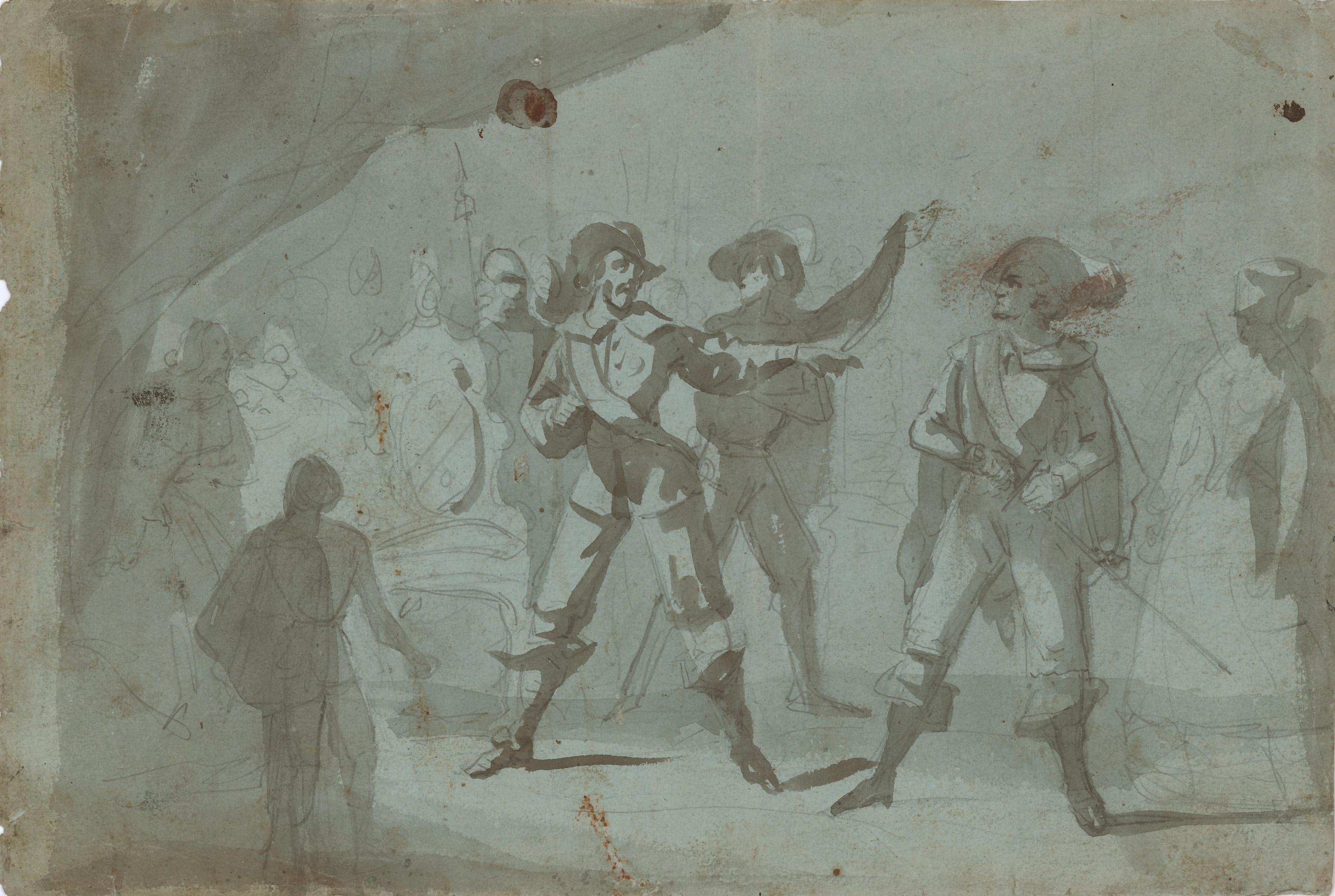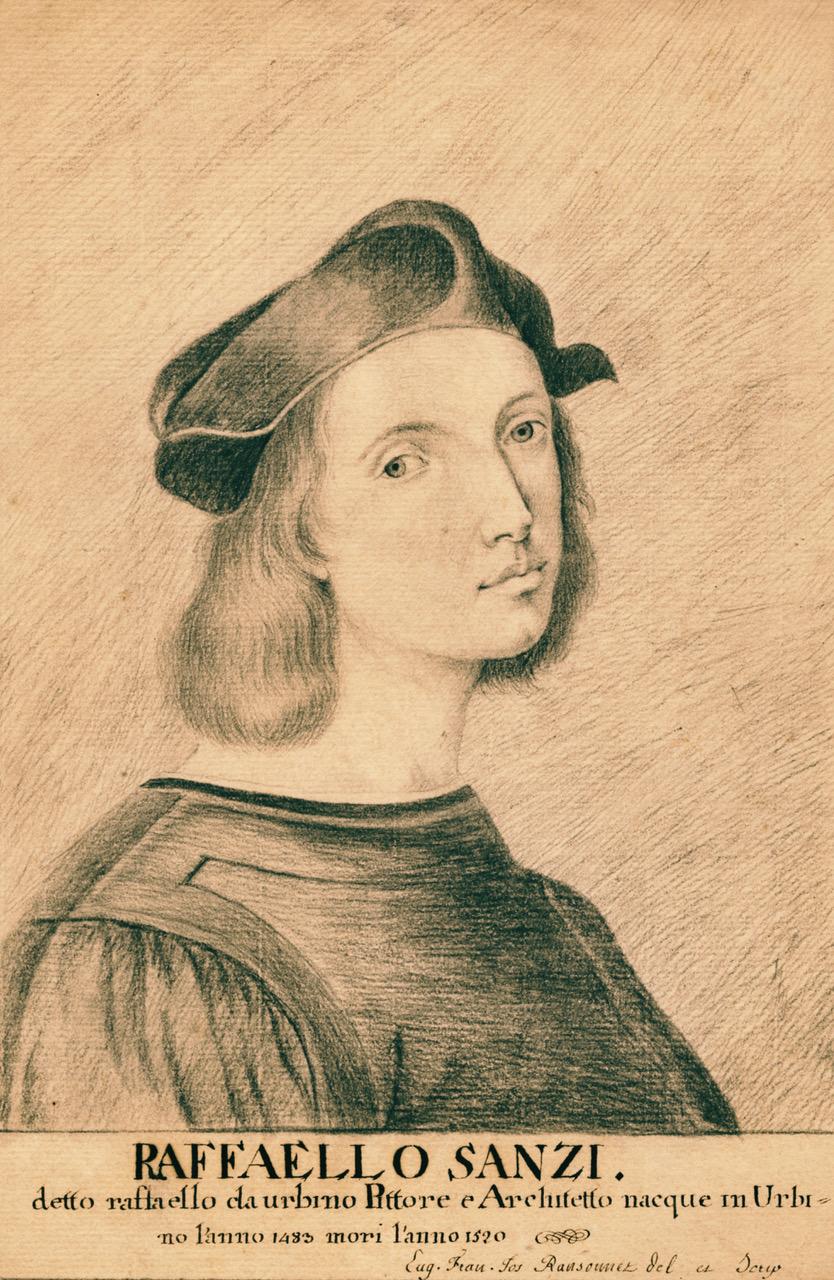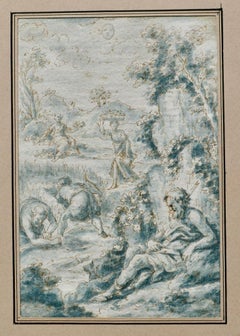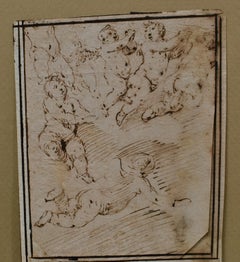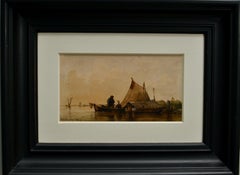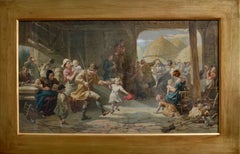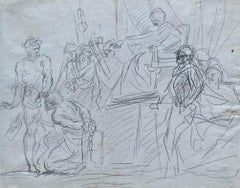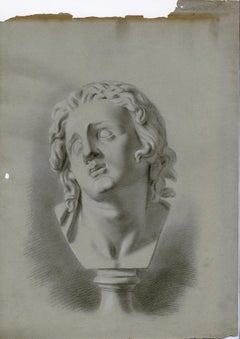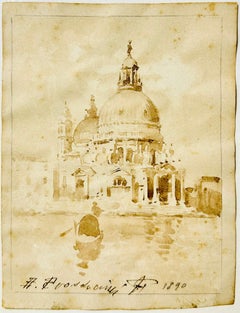Items Similar to Italian School 18th Century Red Chalk Drawing, Polyphemus, Acis and Galatea
Want more images or videos?
Request additional images or videos from the seller
1 of 16
UnknownItalian School 18th Century Red Chalk Drawing, Polyphemus, Acis and Galatea17th/18th century
17th/18th century
$3,073.64
£2,293.44
€2,600
CA$4,276.58
A$4,785.59
CHF 2,489.52
MX$57,662.75
NOK 31,341.89
SEK 29,612.87
DKK 19,795.77
About the Item
An Italian red chalk drawing depiction on paper, probably 17th or 18th century, illustrating the dramatic scene of Polyphemus hurling a boulder at Acis and Galatea. Attributed to an unidentified, probably Italian master, the composition portrays a narrative from ancient Greek mythology where the jealous giant cyclops Polyphemus, in a fit of rage, kills Acis by crushing him with a massive rock. This piece seems to draw inspiration from Annibale Carracci's renowned ceiling frescoes in the Palazzo Farnese, Rome, specifically the "Loves of the Gods" series painted circa 1597–1601. One particular fresco in this series depicts Polyphemus in the act of throwing a rock at Acis and Galatea, suggesting that the artist of this drawing may have been influenced by Carracci's interpretation. While there are notable differences, the compositional similarities indicate a study to the earlier masterpiece. Throughout the centuries, numerous artists visited the Farnese Gallery to study and draw inspiration from Carracci's work, underscoring its significant impact on subsequent art.
The subject matter derives from ancient Greek mythology, specifically the tale of Acis, Galatea, and Polyphemus, made famous through Ovid’s Metamorphoses. The Cyclops Polyphemus, a fearsome, one-eyed giant, is deeply in love with Galatea, a beautiful sea-nymph. However, Galatea’s affections lie with Acis, a handsome young mortal shepherd. Enraged by jealousy upon discovering the lovers together, Polyphemus unleashes his wrath by ripping a boulder from the earth and hurling it at Acis, fatally crushing him. Stricken with grief, Galatea transforms Acis's blood into a river spirit, thus granting him immortality.
The scene has been a powerful symbol in Western art and literature for centuries—portraying unrequited love, jealousy, and tragic loss. It has inspired countless works across time, from Roman frescoes to Baroque painting and Romantic poetry.
Annibale Carracci (1560–1609) was a pivotal figure in Italian Baroque painting. Born in Bologna, he, along with his brother Agostino and cousin Ludovico, founded the Carracci Academy, aiming to reform art by emphasizing naturalism and the study of classical models. Carracci's work is characterized by its harmonious composition, dynamic movement, and vivid depiction of human emotion. His frescoes in the Palazzo Farnese, particularly the "Loves of the Gods" series, are considered masterpieces that bridge the Renaissance and Baroque periods. Carracci's innovative approach and dedication to blending classical traditions with contemporary techniques significantly influenced the trajectory of European art.
- Creation Year:17th/18th century
- Dimensions:Height: 14.18 in (36 cm)Width: 20.48 in (52 cm)Depth: 0.4 in (1 cm)
- Medium:
- Movement & Style:
- Period:
- Condition:Paper laid on paper. Older restoration to lower edge parts and possibly some trimming at lower bottom. Some minor staining but otherwise in seemingly good condition. Now mounted in a passepartout.
- Gallery Location:Stockholm, SE
- Reference Number:1stDibs: LU2608216083102
About the Seller
5.0
Gold Seller
Premium sellers maintaining a 4.3+ rating and 24-hour response times
1stDibs seller since 2023
23 sales on 1stDibs
Typical response time: <1 hour
- ShippingRetrieving quote...Shipping from: Stockholm, Sweden
- Return Policy
Authenticity Guarantee
In the unlikely event there’s an issue with an item’s authenticity, contact us within 1 year for a full refund. DetailsMoney-Back Guarantee
If your item is not as described, is damaged in transit, or does not arrive, contact us within 7 days for a full refund. Details24-Hour Cancellation
You have a 24-hour grace period in which to reconsider your purchase, with no questions asked.Vetted Professional Sellers
Our world-class sellers must adhere to strict standards for service and quality, maintaining the integrity of our listings.Price-Match Guarantee
If you find that a seller listed the same item for a lower price elsewhere, we’ll match it.Trusted Global Delivery
Our best-in-class carrier network provides specialized shipping options worldwide, including custom delivery.More From This Seller
View AllAllegory of Summer, 17th Century Italian Sepia and Watercolor Drawing
Located in Stockholm, SE
A fine Italian watercolor and sepia drawing, an allegory of summer. People harvesting, eating and drinking in a hilly landscape, probably by Antonio Grano (c.1669-1718). In the fron...
Category
Late 17th Century Italian School Figurative Drawings and Watercolors
Materials
Paper, Ink, Watercolor
Italian School 17th Century Drawing of Putti
Located in Stockholm, SE
A fine small Italian 17th/18th century sepia ink study of 6 putti in different positions. Paper mounted on paper. A tergo written "Scuola Lombarda".
A putto/putti are figure in a wo...
Category
17th Century Italian School Figurative Drawings and Watercolors
Materials
Ink
Sea Landscape
Located in Stockholm, SE
A Tranquil Dawn by the Lake
A serene, wind‑still dawn scene in watercolor: a woman and a man in a small boat moored to a jetty, both with their backs to the viewer as they tend to th...
Category
1840s Other Art Style Landscape Drawings and Watercolors
Materials
Paper, Watercolor
Dancing Villagers
Located in Stockholm, SE
A vivid rendering of a a joyous village festivity, a painted watercolor by Walter Goodall, signed and dated 1862. In the foreground, a young girl in a white dress dances with a young...
Category
1860s English School Figurative Drawings and Watercolors
Materials
Paper, Watercolor
Profile Portrait of a Woman Sitting on a Chair
Located in Stockholm, SE
A finely tuned oval drawing by the Finnish artist Ester Helenius depicting a young woman in profile seated on a chair. The room is suggested only by a diffuse background. Signed and ...
Category
1910s Jugendstil Portrait Drawings and Watercolors
Materials
Paper, Charcoal, Gouache
Hermes 1929
Located in Stockholm, SE
An interesting and highly decorative chalk drawing by Edvard Andersson, 1929. Drawn on a quite large scale. Signed and dated EA, 1929. A tergo written "Hermes".
The drawing is exec...
Category
1920s Cubist Abstract Drawings and Watercolors
Materials
Paper, Chalk
You May Also Like
Old Masters Chalk Drawing, 17th Century Italian Sanguine on Paper
Located in London, GB
Sanguine chalk on paper
Image size: 7 x 8 1/2 inches (18 x 22 cm)
Acid free cut-out mount
This 17th century drawing depicts a reclining woman with her back.
The Sanguine chalk that...
Category
17th Century Italian School Figurative Drawings and Watercolors
Materials
Paper, Chalk
Beheading scene in front of an enthroned king, probably a martyr scene
Located in PARIS, FR
Italian School
Around 1700
Beheading scene in front of an enthroned king, probably a martyr scene
Black pencil
21.5 x 28 cm
29.5 x 39 cm
Provenance: Fryszman collection, sale on 01...
Category
Early 18th Century Italian School Figurative Drawings and Watercolors
Materials
Chalk
Study of the Pergamene Head, or The Dying Alexander
Located in Middletown, NY
Graphite with white heightening on greenish beige wove paper, 17 1/4 x 12 1/2 (437 x 317 mm). Scattered edge wear, tears and losses around the perimeter of the drawing. Margins are wide and the image area is clean and intact. Scattered light soiling and toning, all consistent with age.
A dramatic image by a highly skilled draftsman, this works is likely a life study of the Hellenistic sculptural masterpiece of the same title, which is housed in the Uffizi's collection of ancient statues...
Category
Early 19th Century Italian School Portrait Drawings and Watercolors
Materials
Color Pencil, Handmade Paper, Graphite
Basilica di Santa Maria from the Grand Canal, Venice
Located in Middletown, NY
Ink and sepia wash on light wove paper, 5 1/8 x 4 inches (128 x 100 mm), signed in brown ink and dated in black ink below the image. Scattered light foxing and uniform toning. Adhered to nonarchival white cardstock, creating minor cockling, and obscuring the verso.
Alberto Prosdocimi (1852-1925) was an Italian watercolorist and celebrated mansucript illuminator known for his atmospheric cityscapes and interior views of Venice. His canal scences are simple yet masterful, filled with languid motion...
Category
Late 19th Century Italian School Landscape Drawings and Watercolors
Materials
Ink, Handmade Paper
Portrait of Raffaello / Italian School
Located in Middletown, NY
Graphite and ink on handmade, watermarked C & I Honig laid paper, 8 15/16 x 6 3/4 inches (226 x 170 mm). Signed illegibly in ink, lower margin. Scattered light creasing and surface...
Category
18th Century Italian School Portrait Drawings and Watercolors
Materials
Handmade Paper, Ink, Graphite
The Dethroning / Italian School, 18th Century
Located in Middletown, NY
Graphite and grayish ink wash on bluish wove paper, 7 x 10 1/2 inches (177 x 265 mm) (matrix). Scattered surface soiling, adhesive residue, dog-eared corners, and scattered edge tears along left margin, outside of image area. Paper is braced on the verso with two pages from a mid 19th century book with illustrations by C.Perrin. One image depicts a scene of a group of soldiers representing the Holy Roman Empire...
Category
Late 18th Century Italian School Figurative Drawings and Watercolors
Materials
Handmade Paper, Ink, Graphite
